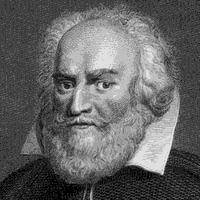The Sixth Book of Homer’s Iliads
...
To this great Hector said:
"Be well assur’d, wife, all these things in my kind cares are weigh’d,
But what a shame and fear it is to think how Troy would scorn
(Both in her husbands, and her wives, whom long-train’d gowns adorn)
That I should cowardly fly off! The spirit I first did breathe
Did never teach me that; much less, since the contempt of death
Was settled in me, and my mind knew what a worthy was,
Whose office is to lead in fight, and give no danger pass
Without improvement. In this fire must Hector’s trial shine;
Here must his country, father, friends, be, in him, made divine.
And such a stormy day shall come (in mind and soul I know)
When sacred Troy shall shed her towers, for tears of overthrow;
When Priam, all his birth and power, shall in those tears be drown’d.
But neither Troy’s posterity so much my soul doth wound,
Priam, nor Hecuba herself, nor all my brothers’ woes
(Who, though so many, and so good, must all be food for foes,)
As thy sad state; when some rude Greek shall lead thee weeping hence,
These free days clouded, and a night of captive violence
Loading thy temples, out of which thine eyes must never see,
But spin the Greek wives’ webs of task, and their fetch-water be
To Argos, from Messe{"i}des, or clear Hyperia’s spring;
Which howsoever thou abhorr’st, Fate’s such a shrewish thing
She will be mistress; whose cursed hands, when they shall crush out cries
From thy oppressions (being beheld by other enemies)
Thus they will nourish thy extremes: 'This dame was Hector’s wife,
A man that, at the wars of Troy, did breathe the worthiest life
Of all their army.' This again will rub thy fruitful wounds,
To miss the man that to thy bands could give such narrow bounds.
But that day shall not wound mine eyes; the solid heap of night
Shall interpose, and stop mine ears against thy plaints and plight.”
This said, he reach’d to take his son; who, of his arms afraid,
And then the horse-hair plume, with which he was so overlaid,
Nodded so horribly, he cling’d back to his nurse, and cried.
Laughter affected his great sire, who doff’d, and laid aside
His fearful helm, that on the earth cast round about it light;
Then took and kiss’d his loving son, and (balancing his weight
In dancing him) those loving vows to living Jove he us’d,
And all the other bench of Gods: “O you that have infus’d
Soul to this infant, now set down this blessing on his star:
Let his renown be clear as mine; equal his strength in war;
And make his reign so strong in Troy, that years to come may yield
His facts this fame, when, rich in spoils, he leaves the conquer’d field
Sown with his slaughters: 'These high deeds exceed his father’s worth.’
And let this echo’d praise supply the comforts to come forth
Of his kind mother with my life.” This said, th’ heroic sire
Gave him his mother; whose fair eyes fresh streams of love’s salt fire
Billow’d on her soft cheeks, to hear the last of Hector’s speech,
In which his vows compris’d the sum of all he did beseech
In her wish’d comfort. So she took into her odorous breast
Her husband’s gift; who mov’d to see her heart so much oppress’d,
He dried her tears and thus desir’d: “Afflict me not, dear wife,
With these vain griefs. He doth not live, that can disjoin my life
And this firm bosom, but my fate; and Fate whose wings can fly?
Noble, ignoble, Fate controls. Once born, the best must die.
Go home, and set thy housewifery on these extremes of thought;
And drive war from them with thy maids; keep them from doing nought.
These will be nothing; leave the cares of war to men, and me,
In whom, of all the Ilion race, they take their highest degree.”

